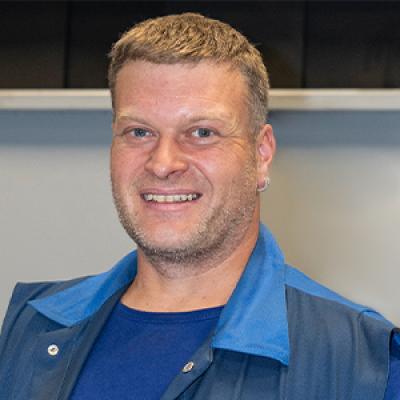Interview with Christian Löb

Christian Löb stands in the middle of the new Framax production in St. Martin. His job requires him to programme both in the office at the computer and directly outside at the plant.

Christian Löb
"I can work on the system just as I do now on the PC. And that helps me a lot. I know how the system works without a PC. That is very valuable."
Christian Löb is a trained plumber and works as an offline programmer in the new Framax production.
How did you learn programming?
CHRISTIAN LÖB: I was trained. The training dealt with the introduction and implementation of digital twins and their programming.

What do you learn during programming?
CHRISTIAN LÖB: How to operate a robot, how it works, what to do in case of malfunctions, how it works together with the plant. What really counts is experience. The more you have, the better.
I can work on the system just as I do now on the PC. And that helps me a lot. I know how the system works without a PC, i.e. manually. That is very valuable.
What do you particularly like about your work?
CHRISTIAN LÖB:
That it is varied and responsible, challenging and exciting.
Have you swapped the welding plant for the office, Mr Löb?
CHRISTIAN LÖB: No. I'm still outside at the plant a lot. But my workplace is now mainly in the office. I work flexibly wherever it is necessary. It's a mixture of practical work and knowledge work. The classic programmer in the software world knows his way around a PC. But I know how to weld. I know all the steps from cutting to finishing the frames.
You are working on the digital twin, aren't you?
CHRISTIAN LÖB: Yes. That is a three-dimensional digital image of the plant. The little yellow and purple arrows that you see in the digital drawing, I create those. These are parts of the program. Each element needs its own program. Each arrow is a point in space that the robot has to travel through. There are always four robots working on one frame. It has to be defined which robot does what. In the twin, it is simulated how the system reacts. Collisions must be avoided.
Thanks to the virtual environment, this is quite easy to represent. The big advantage: while I'm writing the new programs, I don't block production and the plant can continue to run normally. In the past, I did this directly on the line.
If you compare your work today with that of the past: What is different?
CHRISTIAN LÖB: I used to be outside at the plant, everywhere. Now I'm only outside in case of malfunctions or when someone is on holiday. In the past, my main activity was not programming on the PC, I took care of everything. Now I'm mainly in the office in front of a double screen with the robot system as my digital twin on the screen.
What is your original profession?
CHRISTIAN LÖB: I'm an plumber, started at Doka as a welder. Monotonous work is not my thing. I wanted to be able to fix faults and do smaller but also larger programming jobs myself. The expansion of production in St. Martin with a newly built hall gave me the opportunity to take on the role of shift speaker.


